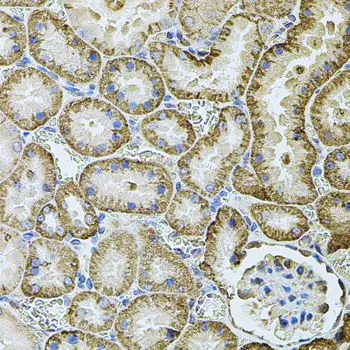
IHC-P analysis of rat kidney tissue using GTX33083 CDH16 antibody. Dilution : 1:100
CDH16 antibody
GTX33083
ApplicationsWestern Blot, ImmunoHistoChemistry, ImmunoHistoChemistry Paraffin
Product group Antibodies
ReactivityHuman, Mouse, Rat
TargetCDH16
Overview
- SupplierGeneTex
- Product NameCDH16 antibody
- Delivery Days Customer9
- Application Supplier NoteWB: 1:500 - 1:2000. IHC-P: 1:50 - 1:100. *Optimal dilutions/concentrations should be determined by the researcher.Not tested in other applications.
- ApplicationsWestern Blot, ImmunoHistoChemistry, ImmunoHistoChemistry Paraffin
- CertificationResearch Use Only
- ClonalityPolyclonal
- ConjugateUnconjugated
- Gene ID1014
- Target nameCDH16
- Target descriptioncadherin 16
- Target synonymscadherin-16, KSP-cadherin, cadherin 16, KSP-cadherin, kidney-specific cadherin
- HostRabbit
- IsotypeIgG
- Protein IDO75309
- Protein NameCadherin-16
- Scientific DescriptionThis gene is a member of the cadherin superfamily, genes encoding calcium-dependent, membrane-associated glycoproteins. Mapped to a previously identified cluster of cadherin genes on chromosome 16q22.1, the gene localizes with superfamily members CDH1, CDH3, CDH5, CDH8 and CDH11. The protein consists of an extracellular domain containing 6 cadherin domains, a transmembrane region and a truncated cytoplasmic domain but lacks the prosequence and tripeptide HAV adhesion recognition sequence typical of most classical cadherins. Expression is exclusively in kidney, where the protein functions as the principal mediator of homotypic cellular recognition, playing a role in the morphogenic direction of tissue development. Alternatively spliced transcript variants encoding distinct isoforms have been identified. [provided by RefSeq, Mar 2011]
- ReactivityHuman, Mouse, Rat
- Storage Instruction-20°C or -80°C,2°C to 8°C
- UNSPSC41116161

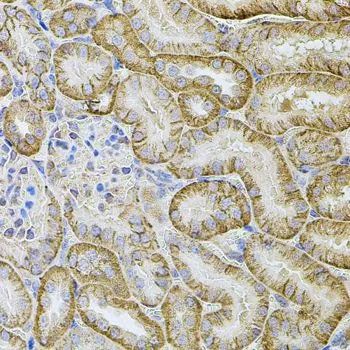
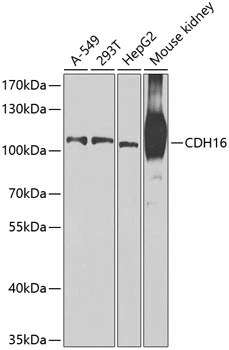
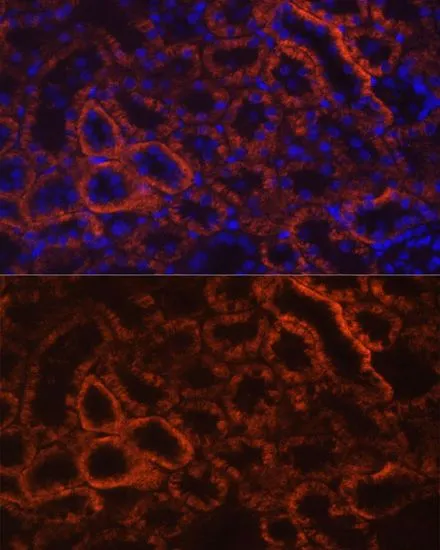

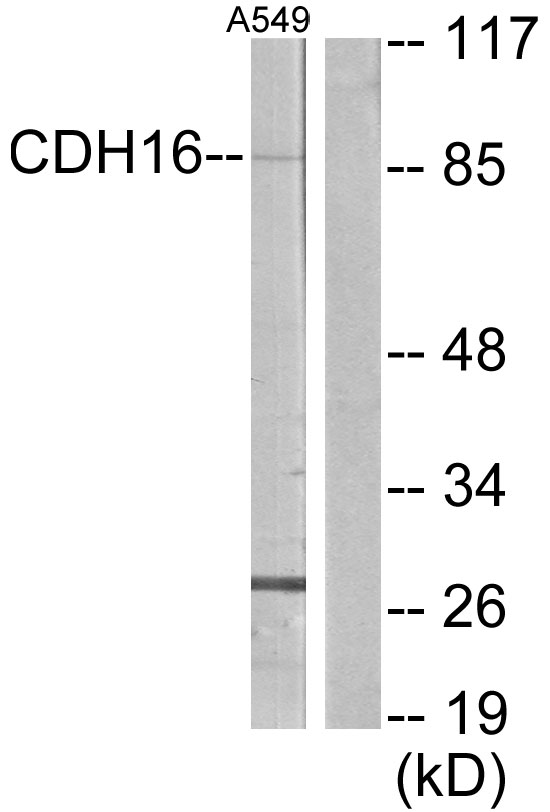



![IHC-P analysis of human thyroid carcinoma tissue using GTX04455 CDH16 antibody [MSVA-516R] HistoMAX?. CDH16 negative papillary carcinoma invading CDH16 positive normal thyroid CDH16 immunohistochemistry.](https://www.genetex.com/upload/website/prouct_img/normal/GTX04455/GTX04455_20230728_IHC-P_5_23072722_121.webp)
![WB analysis of human kidney tissue lysate using GTX34581 CDH16 antibody [SPM594].](https://www.genetex.com/upload/website/prouct_img/normal/GTX34581/GTX34581_20200115_WB_656_w_23060801_747.webp)
![IHC-P analysis of human renal cell carcinoma tissue using GTX34582 CDH16 antibody [rCDH16/1071].](https://www.genetex.com/upload/website/prouct_img/normal/GTX34582/GTX34582_20200115_IHC-P_1077_w_23060801_369.webp)